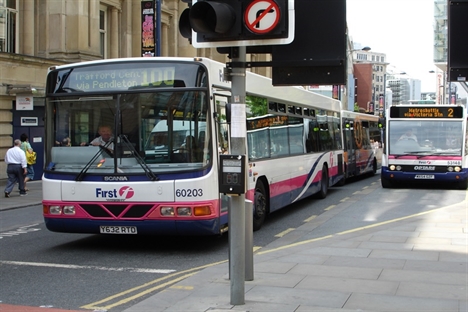20.08.15
Transport groups fear severe spending cuts for local services
Local roads, bus services and cycling could bear the brunt of “disproportionally” severe cuts as part of this autumn’s spending review, transport campaign groups have warned.
Signatories to a letter organised by the Campaign for Better Transport to transport secretary Patrick McLoughlin warn that since major investment programmes for roads and rail are ring-fenced, it leaves local ‘everyday transport’ at risk.
When the chancellor launched his spending review he said departments will be required to model two scenarios – 25% and 40% of ‘savings’ – within their resource budgets in the next four years. The DfT, alongside the DCLG, is one of the ‘unprotected’ departments tasked with looking for economies of scale, especially in revenue funding.
The letter warns that as a result local roads, which already have a £8.6bn backlog in funding for essential maintenance work, are likely to fall further into disrepair, local bus services will see further reductions in services and increases in fares, and existing government commitments to encourage more cycling and walking will be impossible to meet.

To protect local transport, the campaigners want the government to look at ‘smarter spending’ such as creating efficient cross-government funding programmes.
They also call for a “re-visiting” of major transport programmes, especially the Road Investment Strategy, and a rebalancing of capital and revenue funding.
Stephen Joseph, chief executive of the Campaign for Better Transport, said: “Our analysis shows that the spending review risks hitting very hard the everyday transport that people and communities rely on, while programmes like big road building schemes will escape unscathed.
“We hope the transport secretary will ensure that the review has a better balance between the major capital programmes and the funding for this everyday transport.”
Signatories also pointed out that cuts to local transport schemes could have damaging economic and social consequences, for example by reducing access to jobs for unemployed people.
Only earlier this week, the Policy Exchange think tank called on the government to incentivise economic growth through commuter tax benefits, which could potentially open up thousands more job opportunities for those living in smaller towns and more isolated cities.
Jon Lamonte, chair of pteg (the Passenger Transport Executive Group) and chief executive of Transport for Greater Manchester, said: “The city-regions need to see long-term sustained investment in local transport, including on buses and road maintenance. Cuts in these budgets will undermine the economic health of the major cities and our programmes for cutting unemployment and regenerating our economies.”
The transport groups say they plan to push their case in responses to the Treasury’s consultation on the spending review, which closes on 4 September, and to MPs when Parliament returns in the autumn.
The Institute for Public Policy Research (IPPR) has also released a report making the case for creating 'total transport areas' spanning multiple local authority geographies, which should take charge of all transport-related funding and regulatory powers in order to sustain and improve vital bus services in our towns and rural areas.
IPPR proposes a new settlement for buses and other forms of sustainable public transport. Its recommendations build on the government’s successful ‘total transport’ pilots, which support initiatives that take a ‘cross-sector approach to the delivery of supported public road passenger transport services’, and which go with the grain of moves to devolve greater powers to city- and county-regions.